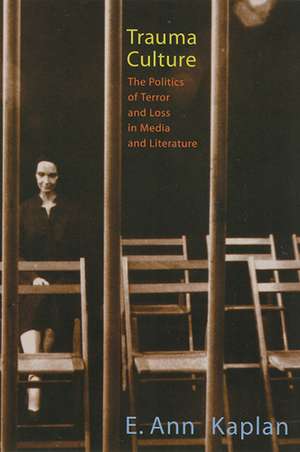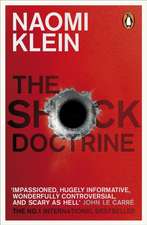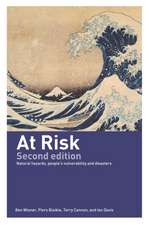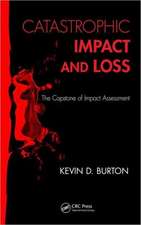Trauma Culture: The Politics of Terror and Loss in Media and Literature
Autor E. Ann Kaplanen Limba Engleză Paperback – 11 iul 2005
It may be said that every trauma is two traumas or ten thousand-depending on the number of people involved. How one experiences and reacts to an event is unique and depends largely on one's direct or indirect positioning, personal psychic history, and individual memories. But equally important to the experience of trauma are the broader political and cultural contexts within which a catastrophe takes place and how it is "managed" by institutional forces, including the media.
In Trauma Culture, E. Ann Kaplan explores the relationship between the impact of trauma on individuals and on entire cultures and nations. Arguing that humans possess a compelling need to draw meaning from personal experience and to communicate what happens to others, she examines the artistic, literary, and cinematic forms that are often used to bridge the individual and collective experience. A number of case studies, including Sigmund Freud's Moses and Monotheism, Marguerite Duras' La Douleur, Sarah Kofman's Rue Ordener, Rue Labat, Alfred Hitchcock's Spellbound, and Tracey Moffatt's Night Cries, reveal how empathy can be fostered without the sensationalistic element that typifies the media.
From World War II to 9/11, this passionate study eloquently navigates the contentious debates surrounding trauma theory and persuasively advocates the responsible sharing and translating of catastrophe.
In Trauma Culture, E. Ann Kaplan explores the relationship between the impact of trauma on individuals and on entire cultures and nations. Arguing that humans possess a compelling need to draw meaning from personal experience and to communicate what happens to others, she examines the artistic, literary, and cinematic forms that are often used to bridge the individual and collective experience. A number of case studies, including Sigmund Freud's Moses and Monotheism, Marguerite Duras' La Douleur, Sarah Kofman's Rue Ordener, Rue Labat, Alfred Hitchcock's Spellbound, and Tracey Moffatt's Night Cries, reveal how empathy can be fostered without the sensationalistic element that typifies the media.
From World War II to 9/11, this passionate study eloquently navigates the contentious debates surrounding trauma theory and persuasively advocates the responsible sharing and translating of catastrophe.
Preț: 313.73 lei
Nou
Puncte Express: 471
Preț estimativ în valută:
60.03€ • 62.85$ • 49.67£
60.03€ • 62.85$ • 49.67£
Carte tipărită la comandă
Livrare economică 05-19 aprilie
Preluare comenzi: 021 569.72.76
Specificații
ISBN-13: 9780813535913
ISBN-10: 0813535913
Pagini: 208
Ilustrații: 1
Dimensiuni: 152 x 229 x 15 mm
Greutate: 0.34 kg
Ediția:None
Editura: Rutgers University Press
Colecția Rutgers University Press
ISBN-10: 0813535913
Pagini: 208
Ilustrații: 1
Dimensiuni: 152 x 229 x 15 mm
Greutate: 0.34 kg
Ediția:None
Editura: Rutgers University Press
Colecția Rutgers University Press
Notă biografică
E. Ann Kaplan is a professor of English, SUNY at Stony Brook, where she also founded and directs the Humanities Institute. She was recently the president of the Society for Cinema and Media Studies.
Cuprins
Introduction : 9/11 and "disturbing remains"
"Why trauma now?" : Freud and trauma studies
Memory as testimony in World War II : Freud, Duras, and Kofman
Melodrama and trauma : displacement in Hitchcock's Spellbound
Vicarious trauma and "empty" empathy : media images of Rwanda and the Iraq War
"Translating" trauma in postcolonial contexts : indigeneity on film
The ethics of witnessing : Maya Deren and Tracey Moffatt
Epilogue : "Wounded New York" : rebuilding and memorials to 9/11
"Why trauma now?" : Freud and trauma studies
Memory as testimony in World War II : Freud, Duras, and Kofman
Melodrama and trauma : displacement in Hitchcock's Spellbound
Vicarious trauma and "empty" empathy : media images of Rwanda and the Iraq War
"Translating" trauma in postcolonial contexts : indigeneity on film
The ethics of witnessing : Maya Deren and Tracey Moffatt
Epilogue : "Wounded New York" : rebuilding and memorials to 9/11
Recenzii
"This book will have significant impact in film and media studies because Kaplan so skillfully 'translates' the most interesting work done in trauma studies and takes it in new and original directions. It is illuminating, lucid, and persuasive."
"This book is an important, compelling, and timely contribution to trauma studies and film and media studies. It is an engaging read-a real page-turner-not only because of its conversational style and beautiful prose but also because it addresses some of the most complex psychological issues facing our culture today."
"Kaplan offers a rich yet concise discussion of trauma culture from objective and personal perspectives, without sacrificing scholarly rigor. Memory, mourning, testimony, and witnessing are key terms, but the book's special strength is Kaplan's expert discussion of film and the media and the ways in which they position spectators. A first-rate, sophisticated introduction to the field. Highly recommended."
Descriere
In Trauma Culture, E. Ann Kaplan explores the relationship between the impact of trauma on individuals and on entire cultures and nations. Arguing that humans possess a compelling need to draw meaning from personal experience and to communicate what happens to others, she examines the artistic, literary, and cinematic forms that are often used to bridge the individual and collective experience. A number of case studies, including Sigmund Freud's Moses and Monotheism, Marguerite Duras' La Douleur, Sarah Kofman's Rue Ordener, Rue Labat, Alfred Hitchcock's Spellbound, and Tracey Moffatt's Night Cries, reveal how empathy can be fostered without the sensationalistic element that typifies the media.

















